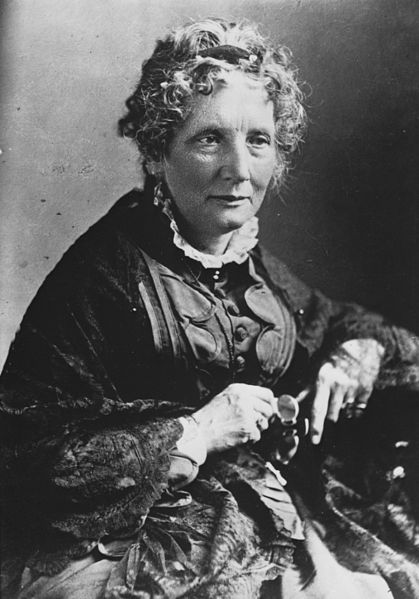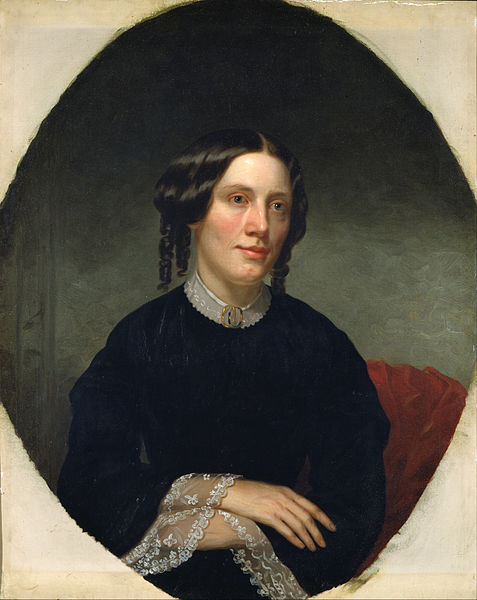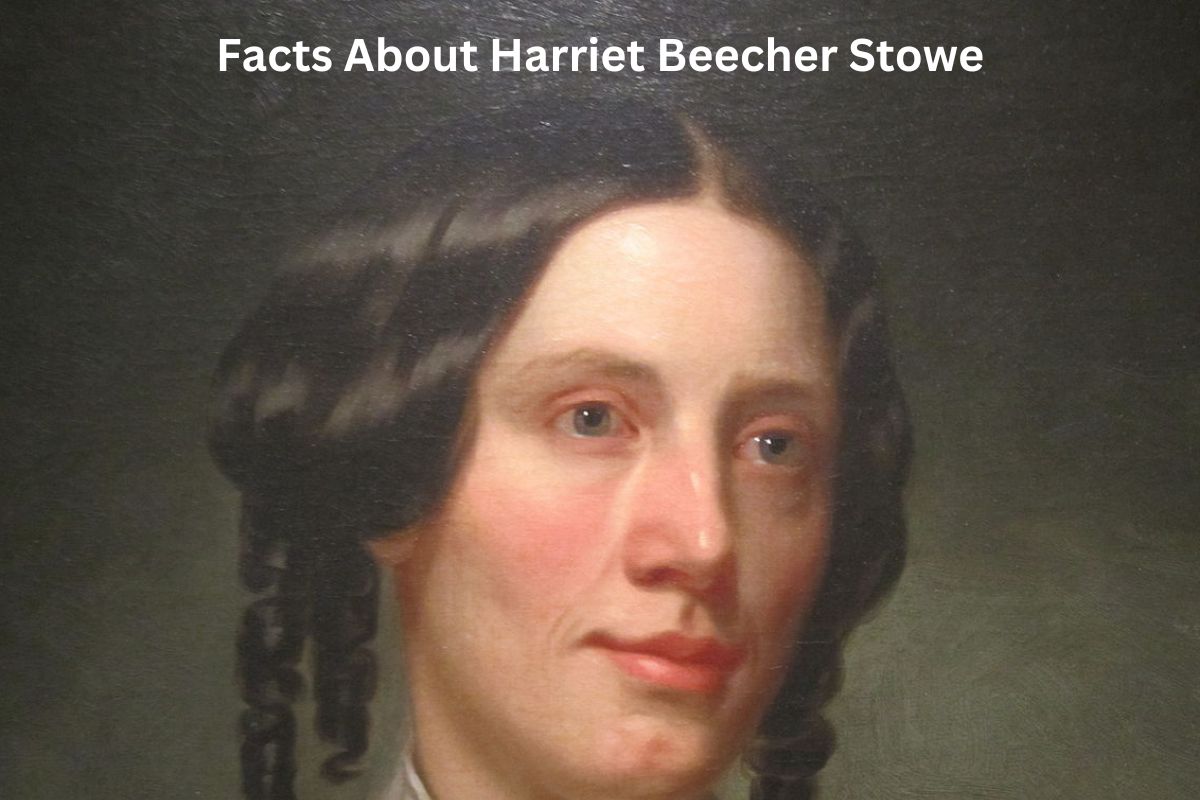Harriet Beecher Stowe (1811-1896) was an American author and abolitionist who is best known for her influential novel, “Uncle Tom’s Cabin.”
Born into a prominent family and raised in a religious and intellectually stimulating environment, Stowe developed a strong commitment to social justice and used her writing to advocate for the abolition of slavery.
“Uncle Tom’s Cabin,” published in 1852, exposed the harsh realities of slavery and had a profound impact on public opinion, fueling the anti-slavery movement in the United States.
Stowe’s work and activism made her one of the most influential women writers of the 19th century, leaving a lasting legacy in American literature and the fight against slavery.
Harriet Beecher Stowe Facts
1. Harriet Beecher Stowe was born on June 14, 1811, in Litchfield, Connecticut
Harriet Beecher Stowe was born on June 14, 1811, in Litchfield, Connecticut. She was the seventh of 13 children born to Roxana Foote Beecher and Reverend Lyman Beecher.
Growing up in a devoutly religious family, Stowe was exposed to discussions about social issues and moral values from an early age, which would later influence her activism and writing.

2. She is best known for her novel “Uncle Tom’s Cabin,” published in 1852
Stowe is best known for her novel “Uncle Tom’s Cabin,” published in 1852. The book tells the story of enslaved African Americans and exposes the cruelty and injustices of slavery.
Also Read: Harriet Beecher Stowe Timeline
It follows the lives of several characters, including the enslaved protagonist Uncle Tom, as they endure the hardships of bondage. “Uncle Tom’s Cabin” portrays the inhumanity of slavery and challenges the stereotypes perpetuated by pro-slavery narratives.
3. “Uncle Tom’s Cabin” had a profound impact on public opinion about slavery
“Uncle Tom’s Cabin” had a profound impact on public opinion about slavery. The novel played a pivotal role in galvanizing the anti-slavery movement, particularly in the Northern states. It exposed readers to the harsh realities faced by enslaved individuals and stirred empathy and outrage.
Also Read: Accomplishments of Harriet Beecher Stowe
The book became an immediate sensation, selling hundreds of thousands of copies in the United States and abroad. Its influence was such that it is often credited with intensifying the tensions between the Northern and Southern states leading up to the American Civil War.
4. Stowe was motivated to write the novel by her strong anti-slavery beliefs
Stowe was motivated to write “Uncle Tom’s Cabin” by her strong anti-slavery beliefs. As an ardent abolitionist, she was deeply troubled by the institution of slavery and its effects on individuals and society as a whole.
Stowe felt compelled to use her writing as a means to expose the horrors of slavery and advocate for its abolition. The passage of the Fugitive Slave Act in 1850, which mandated the return of escaped slaves to their owners, further fueled her determination to bring attention to the issue.

5. She actively participated in the abolitionist movement and advocated for women’s rights
In addition to her literary efforts, Stowe actively participated in the abolitionist movement and advocated for women’s rights. She wrote numerous articles and essays in support of the abolitionist cause, emphasizing the moral imperative of ending slavery.
Stowe used her platform as an influential writer to engage with public discourse and encourage social change. She also supported women’s suffrage, recognizing the importance of gender equality in the pursuit of social justice.
6. Stowe’s father was a prominent Congregationalist minister named Lyman Beecher
Stowe hailed from a family deeply involved in religious and intellectual pursuits. Her father, Lyman Beecher, was a renowned Congregationalist minister and prominent theological scholar.
Growing up in this intellectually stimulating environment, Stowe was exposed to a wide range of ideas and discussions about theology, social issues, and moral responsibility. This upbringing undoubtedly shaped her worldview and contributed to her ability to articulate complex themes in her writing.
Stowe’s sister, Catherine Beecher, was also a notable figure in her own right, advocating for women’s education and founding several educational institutions.
The Beecher family’s commitment to intellectual pursuits and social reform likely influenced Stowe’s own passion for social justice and her dedication to using her talents for the betterment of society.
7. She wrote more than 30 books throughout her career
Stowe wrote more than 30 books throughout her career, showcasing her versatility as an author. While “Uncle Tom’s Cabin” remains her most famous work, she also wrote novels, short stories, travel memoirs, and religious texts.
Some of her notable works include “Dred: A Tale of the Great Dismal Swamp” (1856), “The Minister’s Wooing” (1859), and “Oldtown Folks” (1869). Stowe’s writings often tackled social and moral issues, reflecting her deep engagement with the concerns of her time.
8. “Uncle Tom’s Cabin” was translated into multiple languages and influenced anti-slavery movements worldwide
“Uncle Tom’s Cabin” had a significant impact beyond the United States. The novel was translated into multiple languages, including French, German, Spanish, and Russian, among others.
Its international reach exposed people around the world to the horrors of slavery and contributed to the global anti-slavery movement.
In Europe, the book influenced public opinion and fueled debates about the morality of slavery. It also played a role in inspiring anti-slavery movements in countries like Britain, where it reinforced the efforts to end the Atlantic slave trade.
9. Stowe’s work helped mobilize support for the abolitionist cause in the United States
Stowe’s work, particularly “Uncle Tom’s Cabin,” helped mobilize support for the abolitionist cause in the United States. The novel touched the hearts and minds of many readers, awakening their conscience and prompting them to take action against slavery.
It became a powerful tool for abolitionist activists, providing them with a compelling narrative to challenge the institution of slavery.
Stowe’s work contributed to the growth of the abolitionist movement, which ultimately played a crucial role in the emancipation of enslaved individuals and the end of legal slavery in the United States.
10. She is recognized as one of the most influential women writers of the 19th century
Harriet Beecher Stowe is widely recognized as one of the most influential women writers of the 19th century. Her impact on American literature and the abolitionist movement cannot be overstated.
“Uncle Tom’s Cabin” not only achieved remarkable commercial success but also sparked conversations about race, morality, and the nature of human rights.
Stowe’s courageous stance against slavery and her ability to convey its inhumanity through her writing left an indelible mark on American society. Her legacy as an author and abolitionist endures, reminding us of the power of literature to shape public opinion and challenge social injustices.
